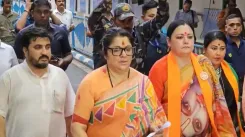Did Karnataka HC Acquit a Father in His Daughter's Sexual Assault Case Due to Lack of Evidence?

Synopsis
Key Takeaways
- The Karnataka High Court acquitted a father due to lack of compelling evidence.
- Witness testimonies were found to have inconsistencies.
- The victim's medical evidence did not support abuse claims.
- The case highlights potential external influences on sensitive allegations.
- Legal decisions require rigorous examination of evidence.
Bengaluru, June 16 (NationPress) The Karnataka High Court on Monday absolved a father from the accusations of sexually assaulting his daughter, reaffirming the trial court's decision.
A division bench comprised of Justices Sreenivas Harish Kumar and K.S. Hemalekha issued the ruling and dismissed the wife's appeal. The allegations against the husband were brought forth by the wife, who served as the principal witness in this case.
According to the wife, her husband sexually abused their daughter when she was just 3 years and 10 months old, claiming incidents occurred in April 2010, the last week of May 2012, and on June 13, 2012.
The trial court had found the accused not guilty due to a lack of convincing evidence.
The High Court remarked that the medical evidence related to the victim did not indicate any definitive signs of abuse. The bench declined to accept the child’s statements, noting that the victim confessed to being coached by her mother with promises of treats and outings to make statements against her father in court.
Upon rejecting the appeal, the High Court indicated that the prosecution did not establish the accused's culpability beyond a reasonable doubt. The medical documentation failed to substantiate the claims, and the witness testimonies exhibited numerous inconsistencies and procedural errors.
The trial court had also suggested that the case stemmed from a misunderstanding between the husband and wife. It observed that the wife appeared to be utilizing the child to hinder the husband from leaving the country and acknowledged her involvement with NGOs for this purpose.
Moreover, it was noted that the wife had started gathering evidence before filing a police complaint.
Challenging the trial court’s acquittal order, the wife took the matter to the High Court.
The accused argued that his relationship with his wife had deteriorated, leading him to contemplate divorce. He alleged that the FIR filed against him was a falsehood aimed at securing custody of the child. He pointed out that although his wife claimed he violated their daughter in 2010, the FIR was not registered until 2012.
The High Court observed that the connections between the wife and an NGO, along with her repeated consultations, indicated a premeditated effort rather than an immediate report, creating doubts about the authenticity of the claims.





